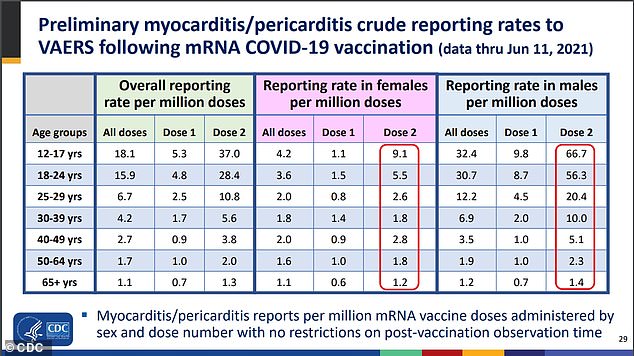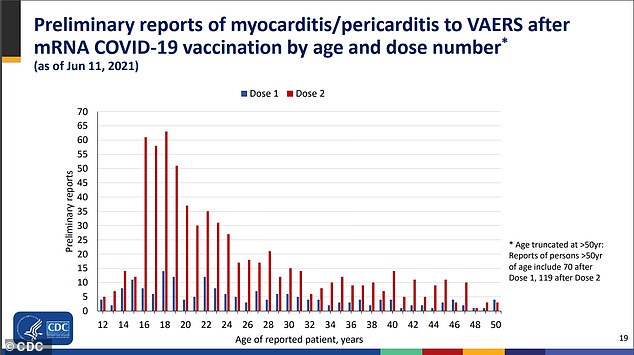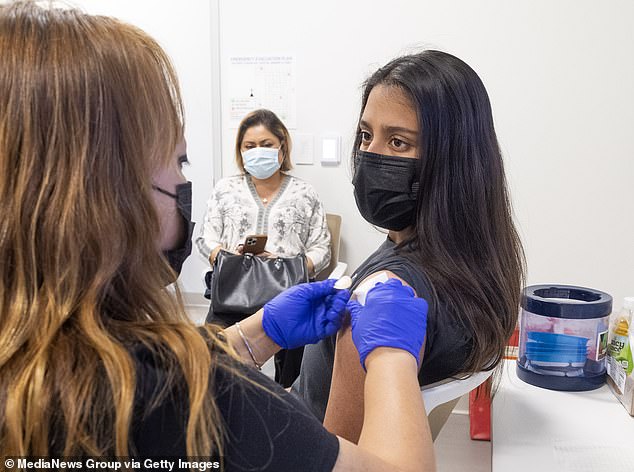Young people are more likely to suffer heart inflammation from COVID-19 infection than they are from the vaccines, a new study finds.
Researchers from Case Western Reserve University, in Cleveland, Ohio, analyzed data from COVID-19 patients and vaccine recipients aged 12 to 17.
They found heart inflammation, also known as myocarditis, after contracting the virus was six times more likely than after receiving the vaccine among teen boys, and 21 times higher among girls.
In June 2021, an advisory group for the Centers for Disease Control and Prevention C(DC) said there is a ‘likely link’ between rare cases of heart inflammation in adolescents and young adults and the Pfizer or Moderna COVID-19 vaccines.
This has led to vaccine skepticism among younger people and less vaccine uptake than seen in older age groups.

Cases of heart inflammation were six times more likely among boys who contract COVID compared to those who receive the vaccine, and 21 times more likely for girls. The condition has been reported by the CDC as a potential side-effect to receiving the vaccine

Young people aged 16 to 20 are most likely to suffer from heart inflammation after receive the vaccine. The condition can also often occur after a viral infection like COVID
‘Our results suggest that, even for this high-risk subgroup [young males], the risk of myocarditis from COVID-19 infection is about 5.9 times as great, at a rate of 450 cases per million,’ the research team wrote in the study, published on pre-pint serve medRxiv.
Researchers analyzed data from around 28,000 teens between ages 12 and 17 for the study.
Half of the participants contracted COVID-19, and the other half received the vaccine.
They found the risk of myocarditis was six times higher among teen boys after being infected with COVID-19 than after receiving the first or second dose of the vaccine.
Among teen girls, the risk was 21 times higher.
The researchers noted that the 16-to-19 age range was most at risk to develop the condition after contracting the virus.
‘Comparative risk can complicate decisions for parents in such highly charged health debates,’ said lead author Dr Mendel Singer, vice chair for education at Case Western Reserve University School of Medicine, in a news release.
‘But our study shows that for parents concerned for their teens about myocarditis/pericarditis, the safer choice is vaccination.’
Fears over myocarditis effecting young teens – primarily males – who received either the Pfizer-BioNTech or Moderna vaccines arose in June, when the CDC reported it as a potential side-effect.
The agency reported that some were developing the condition after receiving their second dose of the vaccine, though still recommended that teens get the vaccine when available.
More than 1,000 cases of health inflammation related to the vaccine were reported.
When a person get diagnosed with a condition like myocarditis or pericarditis, their heart becomes inflamed and expands..
The inflammation may make the heart unable to pump blood properly, it can cause heart failure and sudden death in some cases.
People with the condition often suffer from shortness of breath, an abnormal heart beat and chest pain.
It often occurs after a viral infection, like COVID, and can even be deadly if a person takes part in intense physical activity while having the condition.
Vaccine hesitancy has been rampant amount young people, who are the least likely eligible group to have gotten the shots.

Many young people are hesitant to receive the vaccine, citing potential side-effects like hear inflammation
Many who refuse to get the vaccine cite fear over potential side-effects as a reason.
While contracting the condition is a potential worry when getting vaccinated, the data shows that leaving yourself vulnerable to the virus could lead to a higher likelihood of suffering heart inflammation.
The virus could also come with a host of other issues, such as long-haul COVID, anosmia and in rare cases among young people, even death.
There is also potential that a young person carrying COVID-19 spreads it to someone else who may not be as safe from the virus.
‘There are other consequences from getting COVID-19, including the risk that teens can carry the disease to vulnerable family members,’ Dr Ira Taub, co-author of the study said.
‘I emphasize as well that vaccination is safer than getting COVID-19.’
Source link : https://www.dailymail.co.uk/health/article-9853041/Teens-21-TIMES-likely-suffer-heart-inflammation-COVID-19-vaccination.html











